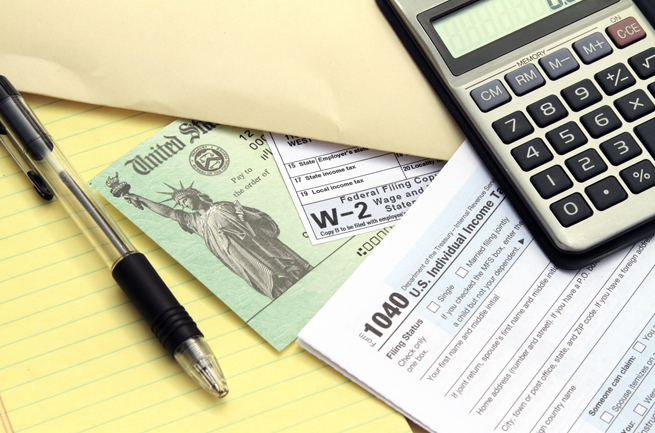We may earn revenue from the products available on this page and participate in affiliate programs. Learn More ›
So you’ve been working from home this year as a result of the pandemic. Maybe your office went entirely remote and you’ve been having daily Zoom meetings with coworkers and clients. Or perhaps you were laid off and are now doing freelance or contract work from the comfort of your own home. With tax season looming, you may be wondering if you qualify for any home office tax deductions. Before you start making a list of write-offs, there are some things you need to know.
I’m working remotely from home. Do I qualify for home office deductions?
In years past, an employee was often able to claim itemized deductions for unreimbursed employee business expenses. For example, if you used a home office for the convenience of your employer, you could lump home office expenses together with other expenses, such as tax preparation and union dues. But the Tax Cuts and Jobs Act suspended write-offs for these types of deductions for employees through 2025.
What does that mean for you?
“Employees who receive a paycheck or a W-2 exclusively from an employer are not eligible for the deduction, even if they are currently working from home,” according to the IRS.
The IRS notes that even those taxpayers who are self-employed must meet two basic requirements to qualify for the deduction: The taxpayer must use a portion of the home exclusively for conducting business on a regular basis, and the home must be the taxpayer’s principal place of business.
Stay tuned, though: There is a chance the rules could change if Congress grants additional Covid-19 tax relief that includes allowing for home office deductions for employees during the pandemic.

Can I write off utilities and travel?
If you’re working from home for an employer during the pandemic, there’s a good chance your utility bills went up because you’re using your household electricity to get your job done. You may even be using your car to travel to clients. If, however, you’re looking to get reimbursed for these expenses through your taxes, you’re probably out of luck.
As part of the Tax Cuts and Jobs Act, the category of “miscellaneous itemized deductions,” which includes unreimbursed employee expenses such as utilities and travel, was suspended. As a result, any additional costs an employee may incur as a result of working from home are not deductible in most cases.
There are, however, some exceptions. To find out if you qualify for any of these exceptions, visit the IRS miscellaneous deductions page. Note: These rules apply only to W-2 employees working from home. Self-employed workers are still able to deduct various qualifying business expenses.
RELATED: 10 Rebates and Tax Credits More Homeowners Should Take Advantage Of
Where you live and work matters.
If the pandemic forced you to work from home and that home is in a different state than your place of employment (if, for instance, you lived in one state and crossed a state line to go to the office every day), you may have some new tax issues to deal with.
Your federal income taxes shouldn’t be a problem, but your state taxes—depending on where you live and work—could be, according to the Wealth Enhancement Group, a wealth management company.
As the company explains, “Working or living in a state can result in what’s called ’tax nexus.’ The term ‘nexus’ is used in tax law to describe when a business has a tax presence in a particular state. Nexus is basically a connection between the taxing authority and an entity that must collect or pay the tax.”

RELATED: 14 Home Improvement Projects You Can Tackle with Your Tax Refund
For businesses, having a physical presence is one of the primary determinants for tax nexus. Employees working in a state, even remotely, may result in tax nexus. Several states have indicated that the presence of a telecommuting employee, even one who has no contact with in-state customers and whose home is not considered one of his employer’s places of business, could trigger the out-of-state employer income tax nexus in the state where he is located. In other words, the employee’s home could be considered an office location, and the employer could be subject to tax nexus in that state. Similarly, an employee could be subject to state income tax in a state where she is remotely located.
While this was an issue before the pandemic, it may turn into an even bigger issue come tax time. While some states are granting Covid-19 exceptions, others are not.
Those unemployment benefits are taxable.
If you were one of the millions of Americans who received unemployment benefits in 2020, you should be aware that those benefits are taxable. According to the IRS, if you are currently receiving unemployment benefits, you can have tax withheld so you can avoid owing taxes on this income when you file your taxes in 2021.
“Taxable benefits include any of the special unemployment compensation authorized under the Coronavirus Aid, Relief, and Economic Security (CARES) Act, enacted this spring,” notes the IRS website.
“If a recipient doesn’t choose withholding, or if withholding is not enough, they can make quarterly estimated tax payments instead,” the IRS says. Check the IRS website for information on estimated tax payments as well as relevant forms and worksheets, including Form 1040-ES and Publication 505.
RELATED: The Ultimate Home Office Planning Guide
Talk to your employer.
For those who have been working from home for an employer during the pandemic, the IRS suggests asking your employer to reimburse you for reasonable and necessary costs you’ve incurred during this difficult time. For instance, if you’ve seen a spike in your utility costs, paid out travel expenses, had to upgrade your internet package, or spent more on child care because you’re working remotely, go ahead and ask your employer for reimbursement, making it clear that you won’t be able to deduct those expenses on this year’s taxes. Just know that your employer has no obligation to reimburse you for such expenses.

















